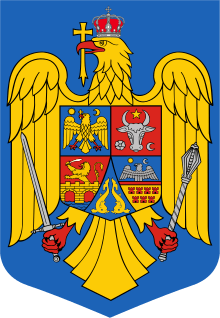Peasant Workers' Bloc
 |
| This article is part of a series on the politics and government of Romania |
|
The Peasant Workers' Bloc (Romanian: Blocul Muncitoresc-Ţărănesc, BMŢ) was a political party in Romania that acted as a front group for the banned Communist Party of Romania.
History
In the 1926 elections the BMŢ received 1.5% of the vote, failing to win a seat. The 1927 elections saw the party's vote share fall to 1.3%, again failing to win a seat. Although the 1928 elections saw their vote increase to 1.4%, they remained seatless.[1]
The 1931 elections were the party's breakthrough, winning five seats in the Chamber of Deputies with 2.5% of the vote.[1] However, the 1932 elections saw its vote share fall to 0.3%, resulting in the loss of all five seats. The party was banned in the aftermath of the Grivița Strike of 1933, and did not contest any other elections. Its role as a communist front organization was partially taken over by the Labour League, created a few weeks before the 1933 elections.